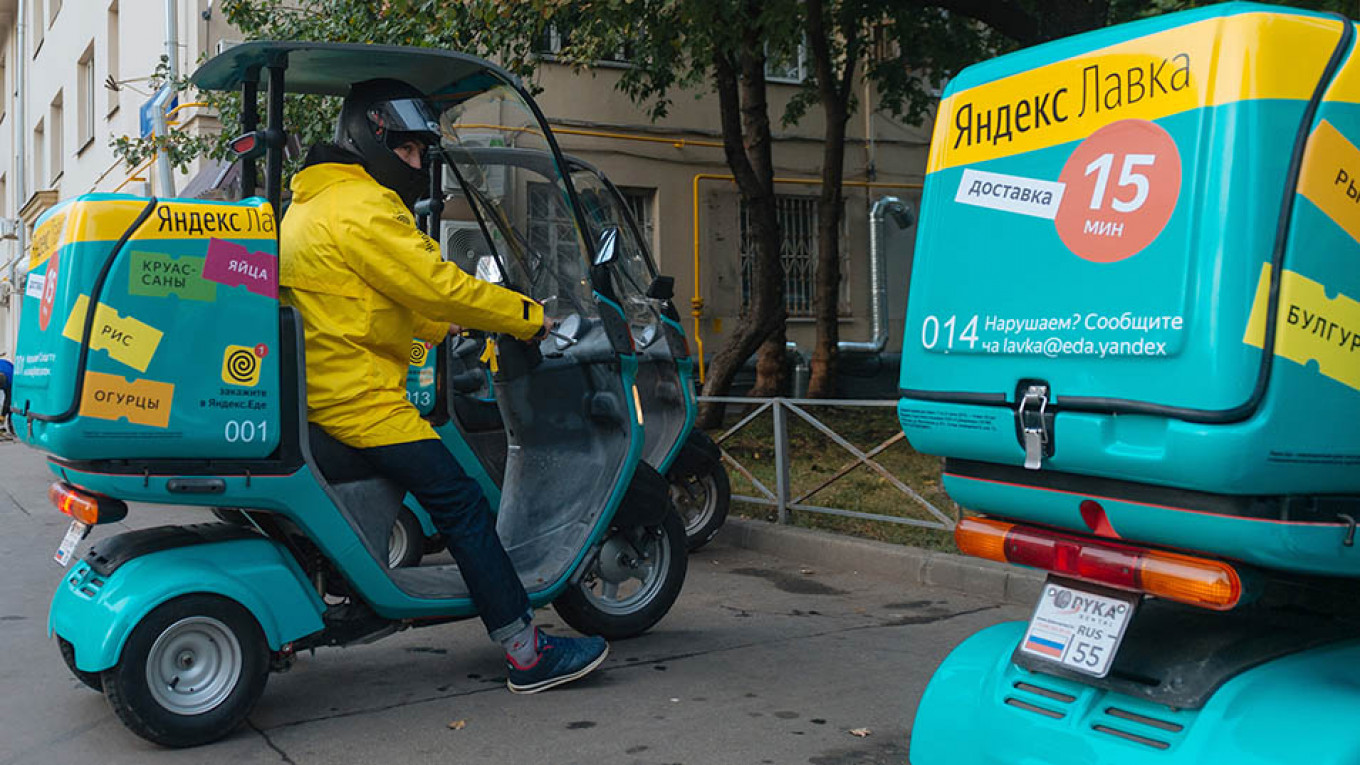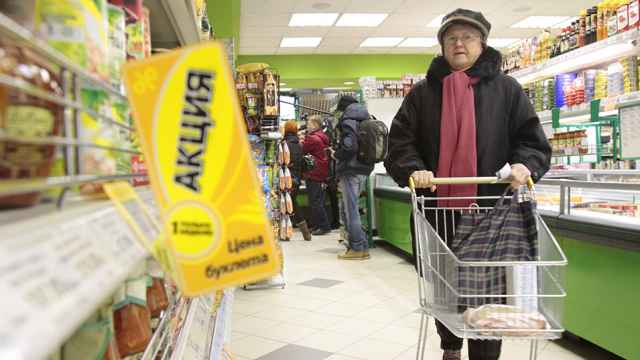In Moscow, online orders delivered in just 15 minutes by bicycle signal what the future of shopping may hold.
Russia’s largest technology company, Yandex, is getting groceries to Moscow homes within a quarter of an hour, free of charge. Its new online service, called Lavka, has spread small warehouses across the capital stocked with about 2,000 items and uses bike couriers to deliver orders. Its strategy is to build market share by being a digital convenience store — the place consumers turn to for ingredients, toothpaste or even a packet of condoms delivered straight to their door.
Founded two decades ago as a search engine like Google, Yandex has since upended the local taxi market and launched a variety of other digital services, including restaurant deliveries, as it surpassed 127 billion rubles in sales ($2 billion). The latest push comes as Russia’s once-slow embrace of e-commerce accelerates. While many companies offer delivery of online grocery orders, consistently doing it this quickly breaks new ground.
“We saw that retailers themselves are too slow to deliver, while delivery startups that work with third-party stores don’t have real-time access to their assortment and often have to replace goods in the order,” Maxim Firsov, head of the division that includes Lavka, said in an interview. “Therefore, we focused on developing our own mini-warehouses with super-fast delivery.”
Yandex entered the Russian online grocery business last year, looking to tap a market that the researcher INFOLine estimates could surge about fivefold to 200 billion rubles by 2023. The two largest players right now are Utkonos and Perekrestok, a unit of X5 Retail Group.
There are loads of services where orders are picked from the shelves of stores, but on-demand grocery delivery is a relatively new retail model. Getir, backed by Yandex Chief Executive Officer Arkady Volozh, uses it in Turkey, while GoPuff is developing a similar business in the U.S. Amazon has Prime Now, which offers two-hour delivery. Other companies, like U.S.-based Instacart, say they can get goods to customers in half that time.
Yandex initially sourced goods from retailer Metro before moving to direct contracts with distributors and manufacturers. It ended 2019 with 50 warehouses and aims to cover all of Moscow with about 200 by the end of this year, while also expanding the service to St. Petersburg.
Overall the business has yet to make a profit as the company spends to expand, although the aim is for that to change as more consumers become accustomed to using the service, Firsov said. Some of the warehouses that have existed for several months are serving regular customers and showing “improving unit economics.”
Andrey Ivchenko, a 32-year-old tourism manager, started using Yandex Lavka in October and now places orders two or three times a week for basics like water and things he and his girlfriend can cook for dinner. His deliveries take seven to 12 minutes.
“I realize it may be more expensive than large grocery chains, but I can afford it,” said Ivchenko, who shops at retail chain Azbuka Vkusa when he has more time or needs delicacies. “It’s a new level of comfort: I can watch TV or do laundry after work, meanwhile my grocery is being delivered. No other service is offering this.”
Each warehouse is about 150 square meters (1,600 square feet), roughly the size of a small convenience store, and serves an area within a radius of about a mile, facilitating quick deliveries. By comparison, online supermarket Perekrestok fills Moscow orders via truck from three distribution centers ranging from 4,000 to 18,000 square meters.
Yandex refers to its warehouses as “dark stores.” Since they’re not serving customers, the company can seek out cheaper, less attractive real estate that wouldn’t be suitable for a shop. They’re located away from street fronts, sometimes in the basement, and feature concrete floors and narrow passages between shelves, with freezer rooms for meat, fish, produce and ice cream.
Average orders range from about 600 rubles to 1,000 rubles with no charge for delivery, though the smallest orders are rejected during peak hours. The most popular products are water, eggs, milk, bananas and lemons. Items including milk, bananas and tea are about 20% more expensive than at Perekrestok, a comparison of both sites showed.
When an order arrives, a warehouse employee sees it on their phone and collects the items in a matter of minutes. A courier then delivers the goods within 10 minutes. Most couriers use off-road bicycles suitable for Moscow winters, with almost 20% of them being electric bikes.
Yandex has grown into a conglomerate by developing or buying other businesses, from online classified ads to music streaming. Its cab-hailing app, Yandex Taxi, is Russia’s largest, and the company controls Uber’s business in the region. The grocery service is part of the restaurant-delivery app, Yandex Eats, and uses the same couriers and software.
“Yandex’s main advantage is direct access to consumers,“ said Ivan Fedyakov, head of INFOLine. “The company lacks purchasing power of large retailers and offers the shortest delivery time instead. This may work well for millenials, but won’t attract the most frugal customers.”
Firsov said he’s fine with that.
“We realize that there are people that will never become our clients,” he said. “But the grocery market is so huge that getting a little chunk of it will already become a big business.”
A Message from The Moscow Times:
Dear readers,
We are facing unprecedented challenges. Russia's Prosecutor General's Office has designated The Moscow Times as an "undesirable" organization, criminalizing our work and putting our staff at risk of prosecution. This follows our earlier unjust labeling as a "foreign agent."
These actions are direct attempts to silence independent journalism in Russia. The authorities claim our work "discredits the decisions of the Russian leadership." We see things differently: we strive to provide accurate, unbiased reporting on Russia.
We, the journalists of The Moscow Times, refuse to be silenced. But to continue our work, we need your help.
Your support, no matter how small, makes a world of difference. If you can, please support us monthly starting from just $2. It's quick to set up, and every contribution makes a significant impact.
By supporting The Moscow Times, you're defending open, independent journalism in the face of repression. Thank you for standing with us.
Remind me later.






